Video
...I guess I fail to understand the issue here. I get the whole "liberals/left-wing people aren't patriotic and like to shit on the 4th of July" or not celebrate it thing, but other than the first tweet (and I guess some of the stuff in the video/ some of the stuff from the 1619 project) I really don't see that with NPR?
I thought that we were all...kind of in agreement that the Declaration of Independence was inherently flawed when it was written in that it didn't include the right to "Life, Liberty, and the pursuit of Happiness" to slaves, Native Americans, etc. I thought we had all accepted that the ideas in the Declaration of Independence and the Constitution were good, but there were some problems with the execution. That's why speeches like Frederick Douglas's "What to the Slave is the Fourth of July" is so powerful. So the NPR article, at least to me, just kind of reads an an acknowledgement of the point and a recognition that these issues shape the understanding of the Declaration of Independence–as well they should.
Furthermore, the discussion of the slur within the Declaration is important. Do you think that you might be affected by the fact that a founding document, a document that is known worldwide to espouse freedom and liberty and that has become the bedrock of one of the most powerful nations on the planet, has a slur in it relating to your race or ethnicity? Personally, I don't think it would bother me very much. And it doesn't bother some Native Americans either. That's kind of the point of acknowledging the different opinions. But it does bother some, and I don't see that as inherently illegitimate or irrelevant when discussing the Declaration. Like it or not, that slur is in the document.
Recognizing that a document is flawed does not make that document any more or less important. Historically contextualizing a document does not mean that one is providing a "trigger warning." There is no trigger warning in the NPR article. Readers are not asked to look away from the Declaration in shame and disgust. Instead, they are asked to look at the Declaration as something more than an absolute good–to critically examine a founding document that has become perhaps more important over the years and a foundational principle of the United States. To, as the article states, examine a document that contains "flaws and deeply ingrained hypocrisies" but also "laid the foundation for our collective aspirations, our hopes for what America could be."
The Declaration is all of those things. The good and the bad. And nothing about that sentence implies or otherwise states any kind of rejection of the 4th of July.
youtube
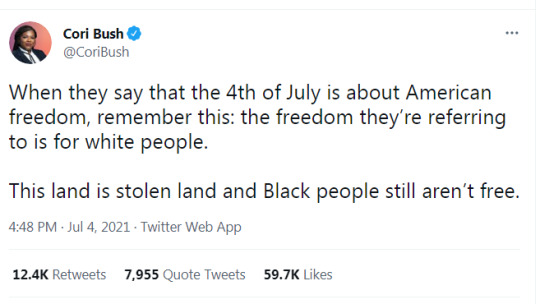
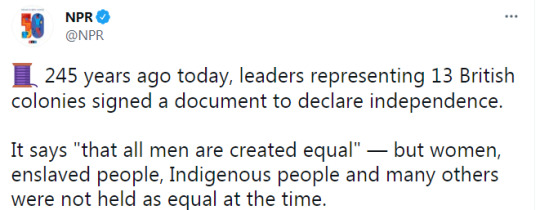
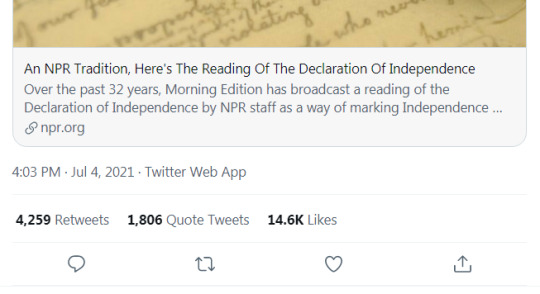
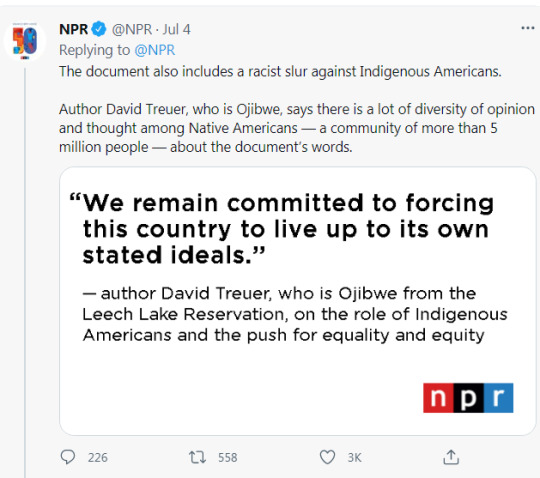
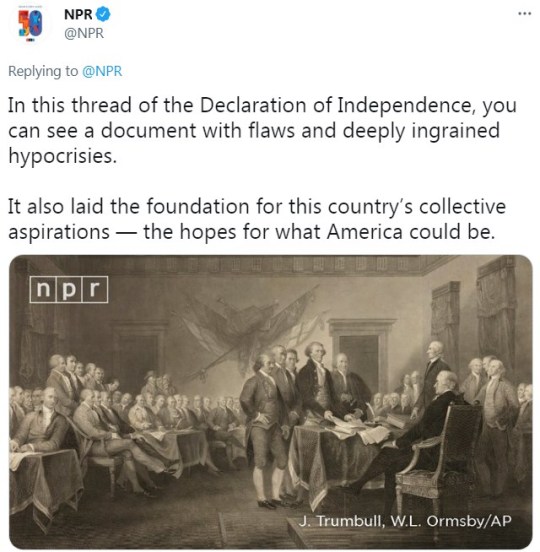
Progressives: We don’t hate America! Being proud of your country doesn’t mean you ignore the problems!“
Also Progressives: America was always bad, actually.
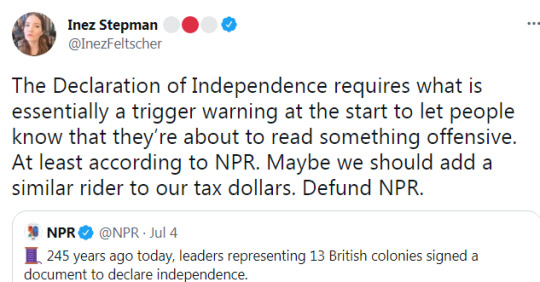
#dunking on the left#nuance#partial rebuttal#politics#history#declaration of independence#I feel like this is gone awry#low effort rebuttal
41 notes
·
View notes
Text
Reblogging this because this post has gotten substantially more attention than I thought and a bunch of people (including the person I'm reblogging this from) have requested sources or news articles. As I'm actually involved in the legal field, I can do a little better than news articles for sources that validate the prohibition against juror research, but I can also validate the original post with some articles.
News Articles that Discuss the Sanctions in the OP
Reuters
Patch
Law360 (requires a subscription)
Message from the US Attorney's Office for New Jersey
Law Review/Research Articles/Court Rules on Juror Independent Online Research
University of Michigan Law Review article discussing different ways of keeping jurors offline and what measures courts should be taking
American Psychology Law Society Division test for seeing if jurors can or cannot remain online (to be added into voir dire proceedings)
Maryland State Court rules on online research (as an example of the kinds of rules that state courts have about this topic)
West Virginia Federal District Court Juror Handbook stating that jurors are not to conduct outside research on p. 12 (an example of how this practice does not change between state and federal courts)
Proposed Model Juror Instructions (ratified after the 2012 proposal)
Hopefully those sources are helpful to people who are curious about the issue! Please let me know if you have any other questions/comments/concerns that I can address as I'm also very interested in this issue and would be more than happy to do so.
I understand why jurors need to be sequestered from media coverage and stuff, but it's crazy that they're prohibited from doing ANY internet research or fact-checking related to the case. Some guy is being fined $11k because he Googled a patch that an ICE officer was wearing in their case -- the jury was told in court it was a trade workers' union patch, but the guy didn't think it was since he was a retired pipe fitter and didn't recognize the logo. So he went home and googled it and says he found it to be a white supremacist logo. And since he googled it, he's being charged with contempt and fined for the costs of the mistrial he caused by doing so. But like… doesn't that mean that our court system is set up so that juries could be lied to (by prosecutors, etc) and be unable to do any verification or fact-checking without literally committing a crime……?
#nuance#response#citations#jury duty#legal opinion#I don't usually do these kinds of responses#but there really has been a lot of interest with this post and I think it will be helpful
26K notes
·
View notes
Text
I have legitimately no idea how one can make a long post and somehow still get information on the article wrong. It's quite... remarkable in many ways. None of them good. Well, at least I'm going to assume that there's some kind of misinterpretation here. The alternative would be bad faith. This is going to be very long because it's a response to something that was already pretty long. However, I'll include a shorter TL;DR as well.
TL;DR: This post can be broken into several component parts:
There is no evidence that using news articles is a bad way to get the data, and you do not provide any reasoning. It's an unstated assumption that needs to be proven
There is no bait and switch. Virulent Hate Project claims to be about Asian racism, is used in a two-part claim about racism against Asians, and the survey report is about anti-Asian racism
The Virulent Hate Project breaks down its data into both harassment incidents and political incidents. It then provides the raw data for each in every stage of the survey report. It doesn't attempt to combine the two save in counting overall numbers of incidents
The political statements being racist need to be taken in the context in which the statements were said. Context is key. In the context of the Coronavirus pandemic, calling something the "China virus" or the "Wuhan virus" or the "Kung-flu" is different than in other contexts and can be interpreted differently
I encourage everyone to read the original "read more" as I've decided largely not to quote directly so as not to make this any longer. Once everyone is familiar with the arguments, we can begin.
First, the Virulent Hate Project (VHP) survey is one of several surveys/ studies that are sourced in the Time article (here is another from LAAUNCH for example with entirely different methodology and somewhat similar conclusions). To conflate the entire article, which is fairly well-sourced with just this one survey is misleading. However, the main problem with your post isn't in its conflation to the Time article (and therefore to journalism as a whole), but rather its critique of the source itself.
You claim that reviewing news articles is going to get you trends in news coverage rather than racism proper. This is correct as an inherent matter–that is to say that reviewing news articles about racist incidents will obviously give you information about news coverage of said incidents. However, you fail to prove the second portion of your statement–namely that information about news reporting around racism is not going to give accurate information about the prevalence of that racism. In order to make this argument in a way that will actually help your point, you would need to argue that incidents of racism are either over or under reported on by the media. You don't do this here (though you do implicitly do this later with over-reporting). Therefore, this argument is currently incomplete. We'll come back to it as we continue through the post. But I'm sorry to say that it's not going to get any more right as we continue on either.
You next make the claim that the VHP is engaging in a bait and switch in going from incidents of pure physical harassment, which are "relatively important", to incidents of (1) harassment and (2) stigmatizing statements made by politicians/ stigmatizing policies against Asians, which are (presumably) less relatively important, before collecting demographic information. This is patently untrue. The VHP in its methodology section explains that it grouped the kind of hate it was analyzing into two broader categories: (1) harassment and vandalism, and (2) stigmatizing and discriminatory statements, images, policies, and proposals. So, there is no bait and switch by the VHP unless the bait and switch has occurred before the analysis (i.e. the VHP says this report is about something that it's not, or the report was originally designed to be about something that was not covered here). Let's look at that possibility, shall we?
The TIME article is about anti-Asian racism. The citation to the VHP is claiming that (1) Asian women were targeted in 65% of situations in which the victims gender was reported, which gels with the data, and that (2) offenders tended to be white when the offender's race was reported. So first, I think we need to dismiss the argument that there's any kind of bait and switch going on with the topic. The VHP was meant to discuss anti-Asian racism, and it's pretty clear that it does that because I don't think that "racism" is limited to just acts of physical violence or harassment. That being said, we still need to determine if claims (1) and (2) are supported by the survey. You don't really talk about claim (1) at all, so I am going to assume that you either agree with the claim or are willing to assume it's true. So, we're done with that one. You also don't really directly address claim (2) as such, but it's clearly relevant to the rest of your post, so we're going to be primarily focusing on that from here on.
However, I would personally think it is a bit of a stretch to call a project focusing on anti-Asian racism that clearly focuses on anti-Asian racism releasing a report dealing with anti-Asian racism being potentially misquoted by a publication, or perhaps skewing their data as a bait and switch. In the former case, it's a knock on TIME and its journalism. In the latter, it's bad faith by the VHP. Neither is really a bait and switch. If it's bad faith, it's more just flat-out lying. Thankfully, neither appears to be the case as we will see later.
Your post then explains that the VHP reduces their list of 1,023 incidents of anti-Asian racism to a mere 183 incidents in which demographic information about the perpetrator was reported. You then further point-out that 55+ of these incidents came from Donald Trump and other politicians and this reduces the validity of the data. This is perhaps correct, and is also pointed-out by the VHP. As in, the VHP continues to separate harassment and vandalism from the political statements/ policies that you are discussing. In the report itself on p. 15-16 breaks down the race of the perpetrator (where reported) in incidents of harassment and vandalism (in all of its component subcategories). I don't know if you missed that, or just did not think it's important, but in every single subcategory most of the harassment was performed by white people. Seeing as these numbers are offered as a refutation to the common claim that anti-Asian racism is being driven by black hostility, this is a pretty big mark against that and a valid use of the data.
It seems like you either (1) didn't see/understand this data and therefore assumed that the data was being corrupted/skewed by the political data, or (2) ignored this data because you deemed it to be irrelevant and instead focused on the political data as it helped with your point. I don't know which of these happened, but it's clear one of them did. Both of them are wrong, but for different reasons.
Also, we can now fully evaluate claim (2) that the offender's race tended to be white when it was reported. Seeing as the VHP fully admits that due to the lower data sample results might be skewed, and offers those results as a data point against common theories (that seem to be based on a misconception), and further seeing as the TIME article seems to basically quote the VHP directly, I can't really find fault with claim (2). So, this completely ends any possibility of a "bait and switch" here.
And now we circle back to the implicit claim about over and under reporting. You make the, again mostly unsupported, claim that the survey was supposed to be about violence and has now pivoted to discussing Trump tweets because Trump is more visible and therefore easier to count. However, based on the fact that VHP has continued to count incidents of harassment, and that these incidents of harassment also support the conclusions, this is flawed. Furthermore, even in the abstract in the survey that you quoted it doesn't say that the survey is about violence. It says it's about racism. Would you say that the President of the United States using racially charged language does not fall into the category of racism?
Perhaps you might seeing as you make an unexplained implicit point about how location-based disease names are common. This is a misleading point. Whether or not the location-related name is offensive depends on the context both of the statements and around the statements. For example, let's take Rocky-Mountain Spotted Fever, or RMSF. No one would say that calling a disease "Rocky-Mountain Spotted Fever" is offensive to anyone. But that's more because of the context around the name than the name itself.
Let's say Rocky-Mountain Spotted Fever becomes more common. People who lived in the Rocky-Mountain region began to be profiled as potential carriers of the disease. There is an increase in acts of harassment (either verbal or physical) against people who have lived, or who are suspected to have lived, in the Rocky Mountains. Rocky Mountain dwellers' shops are vandalized, they are ostracized socially and told to go back to the Rockies and stop making everything unclean around them. Politicians begin talking about how it is those who lived in the Rocky Mountain's fault that Rocky-Mountain Spotted Fever has spread and begin calling for the Rocky Mountain states to "take responsibility" for the fever and "apologize" to the rest of the country and the world for spreading it. This is recognized as a problem by the scientific community (and most media sources) who begin to use the acronym RMSF as opposed to calling the disease Rocky-Mountain Spotted Fever (or who change the name of the disease completely into "Wood Dog Tick Spotted Fever" or something like that. The new name really doesn't matter here). In that context, a politician not from the Rocky Mountains who is completely and totally aware of this situation either through actual or constructive knowledge decides to not only call the disease "Rocky-Mountain Spotted Fever" but also "Colorado fever" and "Rocky fever." In that context, don't you think that the people from the Rocky Mountain region would have at least a little right to be concerned about that politician? What if that politician was the President of the United States? Do you not see how that could be a little isolating? Do you not see how that choice of language could conceivably either indicate the prejudices of the speaker, or at the very least indicate society's acceptance of those prejudices?
This is the scenario that Asian people are in when it comes to calling COVID-19 or the coronavirus the "China Flu" or the "Wuhan Flu" or the "Kung-Flu" (something that is not a location based disease name and wholly inappropriate, though perhaps a funny pun in a joking context). All of those terms (well, maybe not Kung-Flu) would be fine in isolation. But when the name of the disease is COVID-19, and you call it something else that seems to signal its connections to Asians in the above context, I think it is at the very least fair to question your motives for why you are doing so, and to have one of those underlying reasons be racism/prejudice. Especially a person who has repeatedly and unabashedly blamed China for causing COVID-19. So, in context I think it's totally appropriate for VHP to decide that this is racism and report on it as such. Even if it's not Trump's own racism, it's certainly a societal acceptance of some prejudices given the context of the statements.
Oh, and ignoring the context of the statements is also kind of a sign of prejudice. And before you accuse me of trying to Kafkatrap you, consider that the statement "those Jews are dirty" has a different meaning when said by a mother looking at a group of muddy children and a speaker at a white supremacist rally. Context is very important.
You then make the erroneous claim that VHP doesn't count demographic information in other areas. This is wrong. If you read the report, they count the demographic data in all categories and even separate that data by subcategory. So, if you want to discard all of the political data, you absolutely can and are even provided with the means to do so. Doing so also does not change the conclusion (namely that white people are more likely to be the offender than any other race), and does not damage the use of the data against the misconception that racism against Asians is coming predominantly from black animosity.
All-in-all, this was a misguided attempt at criticism of the source. It seems like you got caught up trying to make data fit a narrative as opposed to correcting a narrative based on the data. That's ideology. Not logic. Common misconception on this website. However, that does not make it correct. If you're going to criticize something make sure you read it. And if you read something make sure you understand it before you try to criticize. Otherwise, you just make arguments that are rebutted by the very thing you're trying to attack.
If you are going to say that maybe The Left needs to ease up and increase police funding then for those of us who don’t have the brain of a goldfish you should include some measures to ensure that the police are under civilian control.
#nuance#rebuttal#nonsense#bad logic#long#politics#This is a good example of how just reading the source and not understanding it can create issues
312 notes
·
View notes
Photo
This is bad from all sides and all angles.
TL;DR: Breath play is common but inherently dangerous. That does not mean that it can never be done safely, but it does mean that it can never be entirely safe. The article in question actually agrees with this point. MMA/martial arts comparisons are weird, but there are chokes (mostly blood chokes) in MMA/martial arts. However, directed strikes to the throat are banned under the unified rules of MMA and in most martial arts competitions. Likewise, a head/neck throw are not the same as an attack on the neck, and furthermore an MMA fight really isn't comparable to a breath play scenario.
First, yes breath play is a common kink. However, as the article itself says, there is no entirely safe way to perform breath play. If you participate in breath play you are always putting yourself in a position in which you can harm or even kill your partner. It doesn't matter if you deprive them of oxygen for 10 seconds, 30 seconds, over 1 minute or if you're shooting for the Guinness Book of World Records for holding your breath–depriving someone of oxygen is depriving someone of oxygen. Commonness does not mean that it is ever fully safe which is unique among common kinks. Instead, proper breath play focuses on risk mitigation to bring that chance of harm or death as low as possible.
But unlike other forms of kink, if you're doing any kind of choking whatsoever, it will never be zero. In fact, the article in question actually recommends a form of breath play in which one partner holds their breath and the other tells them when they are allowed to breathe again (while the partner holding their breath may of course breathe earlier if they need to). This sort of "breath play" is perhaps the only real way to do it entirely safely; however, I would argue that this barely (if at all) qualifies as breath play. Otherwise, any kind of breath play takes one immediately out of Safe Sane and Consensual (SSC, or fully safe kink) into the realm of Risk Aware Consensual Kink (RACK or risk-mitigated kink). That is substantial and deserves more play than some of the pro-breath play people are giving it in this post.
However, just as RACK implies, not all types of breath play are created equal in terms of risk. For example, ligature strangulation, or any kind of strangulation in which the partners are not facing each other are more dangerous. That is not to say that they automatically result in death. That's the wrong lesson to take from this. Rather, it just means that these types of play are more dangerous and therefore more likely to result in harm or death. That's all. Anything else would be to overstep. It's still possible to consent to these forms of play (and even to have them be done as safely as possible), but in my view that consent definitely needs to be risk-aware for it to really count.
Onto the argument (I guess?) about MMA and neck strikes and the like. Directed strikes to the throat are banned under the unified rules of MMA. So any kind of attack targeting the neck needs to be something other than a strike. That is not to say that one cannot touch someone's neck. In fact, a rear naked choke, a very common finisher in MMA, is entirely predicated around using a blood choke by pushing someone's head/neck into your arm and choking them until they tap or pass out. This is definitely a form of strangulation (though the real choke isn't the lack of air but stopping the blood in the arteries even with the airway unobstructed, which is why it's more of a blood choke) so any argument about a lack of strangulation is just incorrect. . Here's an example of how to perform a rear naked choke from Bas Rutten.
undefined
youtube
However, there are no submission holds that I have seen in MMA (or most forms of competitive martial arts) that have any kind of manual strangulation like you'd see in a horror movie (or in most breath play). So, that's a valid point as well. Likewise, in MMA, there is a referee who is specifically supposed to watch for and break-up submissions once the opposing fighter has tapped or passed out. This isn't typically the case in most breath play scenarios, so I wouldn't necessarily compare the two.
Oh, and neck throws are more like headlocks than any kind of gripping around the neck. If you watch how the judo throw is done, the grip is actually on the opponent's gi rather than on their neck. So, any throw using the neck/head doesn't really seem to have any attack on the neck or choke added to it. Therefore, I don't think that's the best rebuttal to the idea that directed throat strikes and attacking the neck are banned/limited in many martial arts (which is in fact true).
Honestly, I don't have any positive or negative feelings toward the article in question. And I wouldn't necessarily discourage people from participating in breath play so long as they know the risks. However, they absolutely need to know those risks, and to know that there's no way to eliminate them entirely if there's going to be any strangulation involved.
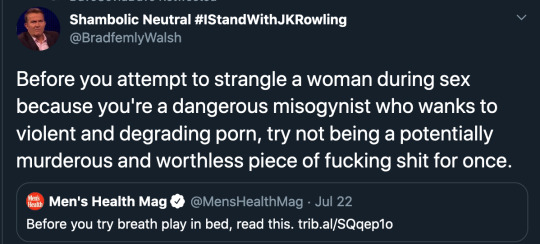
#nuance#rebuttal#breath play#cw kink#mma#A weird collision of two of my interests that I really don't talk about a ton on tumblr#kink#Youtube
3K notes
·
View notes
Photo
Although Zyklon B was in fact mentioned in the brief, this is a really misleading summary of the argument in the brief. But please, don’t believe me. Read the brief yourself. And then read this post I made based on my prior education on how international civil litigation for human rights abuses and specifically Alien Tort Statute (ATS) cases work. TL;DR (but you should): Postsforposting is largely correct in that the issue really wasn’t the slavery but the jurisdiction of the court. In fact, the truth or falsity of the slavery accusations (and therefore whether or not they needed to be excused whatsoever) was not really discussed.
As for the argument in the article/ tweet, I have no idea how the author can literally link the brief and then get the restatement of the brief’s argument misleadingly wrong. The statement that the brief discussed how the international community has not traditionally held that liability extended to corporations (rather than to individuals) is entirely correct; however, the context of Zyklon B manufacturing makes substantially more sense in context. The brief discusses how the Nuremberg trials extended the traditional liability for sovereigns to individuals, but not to corporations. Therefore, while the owner and two employees of the firm that manufactured Zyklon B were indicted, the actual firm itself was not. It’s not that someone cannot be held accountable for child slavery, it’s that the companies themselves are not held responsible for these sorts of actions under international law. Additionally, Zyklon B is explicity used as an extreme example which is to say “even in this case the company was not held liable–the individuals were.”
The brief goes on to mention the ICTR and ICTY tribunals (dealing with genocide and crimes against humanity in Rwanda and Yugoslavia respectively) as followers of the Nuremberg tradition of not extending individual liability to corporations. The brief further makes the claim that there is no real rulebook on how to create this liability for corporations, and that if such liability is to be created it must be done by Congress as opposed to the judiciary. This is disputed by other amicus briefs, as well as by other cases, but that’s kind of outside the purpose of this post which is more to clarify the argument in the brief itself.
For what it’s worth, this is a fairly extreme argument, and one that I personally do not agree with. However, it rests on a little sounder footing than merely “we didn’t charge the firm that made Zyklon B, therefore we can’t charge Nestle and Cargill for child slavery.” Likewise, this argument was rejected by the Court who instead applied the first section of the brief based on Kiobel rather than the more extreme argument predicted on an application of Jesner and the above-discussed international norms.
I have no idea how this got a little twisted in the Slate article, but I do think that the article’s reporting is at least somewhat misleading for those who either don’t know the type of law in question or don’t read the brief. And that’s unfortunate. I think that the author’s biases, which are front and center throughout this piece, impede on the reporting a little. I can’t fault anyone who read the Slate article from coming away with a bit of a skewed perspective on the brief. Instead, I fault that article’s author who really should know better.
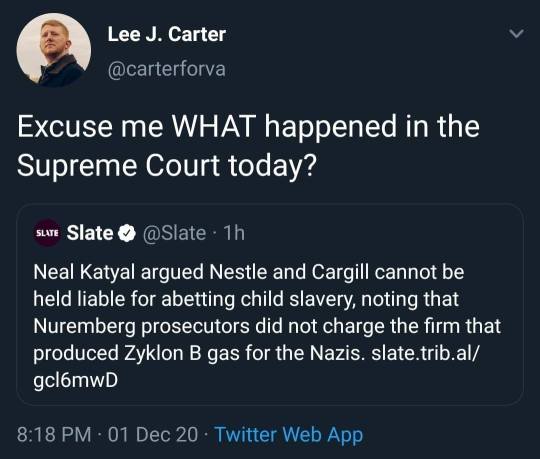
Ah yes, 2020.
Where corporations legally justify child slavery because of Zyklon B.
317 notes
·
View notes
Text
...I'm sure that's not the case. Or at the very least I hope it's not. But, you're going to get in anyway.
However, I really don't have much new theory to add seeing as others already brought up how many citations are strict liability, as well as MPC culpability states. I guess I can give the ordering of culpability states which are (in order of declining culpability):
Purposefully/Intentionally
Knowingly
Recklessly
Negligently
So the idea that cats are reckless isn't necessarily a bad one. I suppose I do have an issue with the idea that cats are capable of a "conscious disregard" to a "substantial and unjustifiable" risk such that the behavior constitutes a "gross-deviation of the standard of conduct that a law-abiding person would observe in a given situation." Cats might understand that you're upset by their behavior and perhaps that's a bad thing, but I've seen no level of understanding of the actual risks innate to the action as is required by recklessness. If I was required to defend a cat from a recklessness offense, pretty sure I could do it.
Now, let's do something more fun. If cats can be reckless, then why can't they have constructive knowledge? Under the MPC, an individual commits an offense "knowingly" when:
(i) if the element involves the nature of his conduct or the attendant circumstances, he is aware that his conduct is of that nature or that such circumstances exist; and
(ii) if the element involves a result of his conduct, he is aware that it is practically certain that his conduct will cause such a result.
If we are claiming that a cat can commit a conscious disregard of substantial and unjustifiable risk, then who is to say that a cat also cannot be aware that their conduct is wrong, or that the consequences of their conduct is wrong? Who is to say that my cat does not gain actual or constructive knowledge that he is not supposed to be on the table when I continuously tell him (occasionally with punishment in the form of a squirt bottle) that he is not in fact supposed to be on the table? If cats can be reckless, then I see no reason to say that they cannot also have knowledge.
Of course, then you end up with cat defense lawyer trick #1: Competency to stand trial. This would even work for many citation-related offenses. I doubt that a cat will be able to competently assist counsel, likely will not understand the charges against them (unless you have a trial so quickly that it calls multiple constitutional amendments into question), and would certainly lack a rational and factual understanding of the proceedings. Therefore, a cat would not be able to satisfy the Dusky test, rearticulated in Indiana v. Edwards, and any court could not convict them. They would instead be remanded to in-person treatment to make them competent to stand trial (which might take... a while).
Oh, and just in case someone gets the bright idea of trying to sue the cat for civil damages, that's likely going to be even less effective. As we've seen in multiple jurisdictions and how they treat minors, the standard is less likely to be a "reasonable person" standard and more likely to be a "reasonable cat" standard which is much harder for you to win on. Unless, the judge is a dog person... Then you might have a chance.
Sadly, you're probably better off telling Mr. Snugglesworth that he's a "bad kitty" and supplementing with a spray bottle as he slinks back off to his life of crime. Unconvictable. All hail our cat overlords.
Cats cannot commit crimes because one of the core tenets of our society’s theory of criminal justice is that a crime consists of both criminal action and criminal intent, and there can be no crime if either element is absent. Criminal intent in turn requires understanding what you’re doing, and cats don’t understand anything.
Crows, on the other hand, fully understand when they’re breaking the rules, and consequently are capable of a variety of crimes, up to and including tax fraud.
#nuance#response#criminal liability of cats#this was a very fun post to write#I will also be accepting asks on the criminal liability of cats#I can also do dogs if someone would like that#Having had the pleasure of both's companionship I'm in a good position to talk about this
11K notes
·
View notes
Text
So, far be it for me to discourage people promoting prison/carceral reform, but there's potentially some misinformation here based on... one of the sites previously linked.
Here is an article/opinion from the same place as the prison labor statistics called "Confronting Prison Slave Labor Camps and other Myths" in which the second "myth" confronted is the idea that carceral labor is modern slavery. It's not. OLDER carceral labor, where people were not paid at all was slavery. The 13th Amendment is now used to get around things like minimum wage laws which would otherwise apply. But even if one wants to argue that it's like slavery, it's definitely not slavery (even if it could be).
Furthermore, in arguing that prison labor is slavery, be sure to take into account the opinions of the prisoners themselves which are quite varied. While some prisoners hate the conditions and their pay and become disillusioned with the system, others enjoy the work and find it fulfilling. Furthermore, as that piece points out, there are other considerations than the obvious "prisoners do not need to be paid minimum wage" that factor-in to whether or not major companies want to use prison labor and are driving prison expansion as a result of said desire for prison labor.
Finally, I have my personal experiences working with people incarcerated long-term. I work with the Innocence Project. My home state does not have widespread prison labor programs. I've talked with many inmates–most of whom were serving at least 20 years in prison. The number one thing they are is bored and lonely. When we called, they were so happy to be able to tell their stories, their theories, their ideas and hear that someone wanted to believe them. The only other time where they got anything resembling that is when they took classes or were allowed something other than just recreation/yard time. Prison labor, for as terrible as it might sound to people not incarcerated, could very well be a haven for people who are incarcerated. Labor is more than just a way to earn money (or at the very least, it should be more than just a way to earn money). So, it might be worth keeping that perspective in mind when we're talking about prison labor as akin to slavery.
All-in-all I'm all in favor of prison and criminal justice reform. But I don't think that the above analogy is the way even if it's popular. In fact, overzealous non-thoughtful action might end up hurting the very people we are ostensibly trying to help.


Image Description.
Facebook post from Matt Norris.
Post reads like a conversation between 2 people:
Prison labor is a problem we need to address soon.
Convicts in prison should have to work like the rest of us.
You mean like slavery?
No, we’re giving them 3 meals and a bed, at our expense, while they just sit around and watch TV. They should have to work!
Right. Like slavery.
It’s not like slavery!
Can they leave?
No.
Can they refuse work?
No.
So how exactly isn’t this slavery?
We DO pay them!
Do we pay in accordance with labor laws?
No. We pay them between 33 cents and $1.41/hour with a maximum daily wage below $5, then take up to half of that as room&board fees and victim compensation.
Right. So like slavery.
BUT.
No.
Image then links to this url.
Below URL image reads “fun bonus fact: enough of our labor market currently relies on labor at these depressed rates, that it has a substantial downward pressure on both wages and job availability in low-skilled sectors. Immigrants aren’t taking your jobs. Slavery is.
End description.
I’d also like to add it’s not just private prisons. It’s also private detention centers where ICE keeps the immigrants.
-fae
#nuance#response#partial rebuttal#prison labor#prison#I think that people's hearts are in the right place here#but they aren't totally thinking through the consequences of some of the rhetoric here#If they were to do that it would be a lot more complicated
104K notes
·
View notes
Note
re: no-knock raids.
They seem pointless to me, and really just a way for the police to flex and enjoy their power. Any amount of evidence that could be destroyed enough to leave no trace in the time it takes them to knock and get inside was probably not substantial evidence in the first place.
I largely agree with this Anon. Good take! Yeah, especially about the evidence thing.
There are also so-called "exigent exceptions" wherein an officer can enter a house without a warrant if the destruction of evidence is imminent. So, if a police officer knocks on your door to speak with you and hears you say "oh shit! Flush it!" well, they no longer need to wait for a warrant and can enter and conduct a limited search for whatever it was that you were intending to flush. They are then empowered to arrest you and/or your coconspirators depending on what they find. So, you wouldn't even necessarily need a no-knock raid to prevent the destruction of evidence (though, I don't really agree with the extent of this exigent authority either).
Furthermore, another justification people use for no-knock raids is officer safety. But, as we've repeatedly seen, it's not like police get shot at less when they don't knock. So, I think that's a little hollow as well.
3 notes
·
View notes
Text
So, it's very obvious to me that SYABM and others who are reblogging this don't understand Battered Women's Syndrome (BWS) and the associated legal arguments. I covered most of this in an earlier response to this post here, but I'll restate the prevalent parts again after quoting.
Yes, killing someone who is not presenting an imminent deadly threat and physically can’t keep you from leaving or assault you in any way is generally not considered self-defense.
Right. No one is disagreeing with this. This isn't a response. Menalez and many others recognize that this is a fact. Their argument is that it shouldn't be. Yours an implied "it should be" but just stating the facts as everyone accepts them is not an appropriate response to the contention that the facts shouldn't be true. That's like responding to someone saying "you should have used more salt" with "but I didn't." You're dodging the question and saying things that everyone agrees on.
Now, onto the actual contentions. As I summarized in my post, and as you stated here, the current standards for self-defense usually don't cover most instances of BWS. I think that's a mistake. Some instances of BWS look like State v. Norman where a woman endured repeated abuse from her husband over years including (but horrifyingly not limited to): Punching, kicking, having cigarettes put out on her, facial scarring and disfigurement, having hot coffee thrown at her naked body, having glass broken against her face, forced prostitution for money (her husband did not want to work), humiliation of the defendant to her family and friends, food deprivation for days, sleep deprivation for weeks, etc. Now forgive me, but I think a woman snapping after 20 years of this treatment and killing her husband is a little different than someone murdering a business partner or a complete stranger in cold blood.
However, the Supreme Court of North Carolina disagreed. he court held that despite the horrible abuse that the defendant endured, and the distinct possibility that had her husband lived she would have been subjected to yet more horrible abuse, the fact that she shot her husband while he slept meant that there was no reasonable, objective fear of imminent harm. Mere subjective belief from the defendant of the inevitability of future acts, regardless of the strength of evidence to support these conclusions was insufficient. And while the defendant’s abuse was terrible, and there was abuse the day before the murder, there was no abuse in the period directly before her husband fell asleep. That seems like there's a little bit of a weird standard there to me–possibly some sexism involved in how the legal system determines what is or is not "reasonable" in terms of self-defense–but you might disagree.
However, if you do, I want to hear why. Why is a woman who killed her husband in his sleep after being subjected to 20 years of what we would call a crime against humanity if inflicted on a broader population the same as a cold blooded murderer who premeditatedly kills a stranger because he or she wants to? Show your work.
As for the murder charge/conviction rate, I don't know the actual number off the top of my head, but it's pretty high. Self-defense usually means that there's a murder charge, and if it's a BWS case, the murder charge is even more likely because it means that the self-defense claim is itself conditional on the jury's belief/ the veracity of the BWS claim. Which... is not super likely to be believed. According to April 2021 update to the American Jurisprudence Proof of Facts, between 60-70% of women claiming BWS who are convicted are affirmed on appeal regardless of the convincingness of their expert testimony (Am. Jur. Proof of Facts 2d 1 (originally published in 1983) (April, 2021 ed)). Plus, there are further issues with establishing BWS including the total number of events that need to occur before claiming BWS, limitations of self-defense claims even after BWS is proven, etc. It's a very complicated area of the law. You clearly don't understand it, which is fine, but it warrants a little more than just a couple paragraphs of dismissal.
And you only got to the impact report because you dismissed the first source (a seminal piece of legal scholarship) and the second source (a strong piece by the law firm Linklaters) to try and find a weaker source that you can attack. And you did it. That's a bad source. Doesn't prove your argument seeing as you have no source and have yet to respond to the first two sources which are better.
You're using the claim of Gish Gallopping wrong as well. A Gish Gallop really doesn't work in this kind of setting, and if it did would require more sources. Likewise, when someone is legitimately asked for sources and provides them, you can't then turn-around and accuse them of a Gish Gallop in good faith. You (or at the very least your side) asked for the information. If you can't be assed to read it then that's on you. And that did happen. If you go through the notes, it happened quite a lot actually.
The first post actually does have a qualifier? The word "most" is a qualifier. Without it, it would refer to all female murderers. Now it's just referring to "most" (which we'll assume is some percentage over 50% but probably not up to 90%). By definition, the qualifier removes at least 10% of female murderers from discussion. Also, it's entirely possible that Menalez doesn't agree entirely with the OP–just as I don't agree entirely with Menalez. We're not talking about "all" female murderers like the OP said. We're now talking about "most" female murderers. And personally, I wouldn't classify "a large portion" as a retreat from "most" based on my reading of the sentence, but that's subjective.
It's fine to point out that Menalez doesn't totally agree with the OP. That still doesn't respond to her point. Maybe you don't want to do that. Maybe you just want to respond to the easier claim that all female murderers are different from all male murderers. If so, then Menalez moved the goalposts. If not, and you actually want to respond to the points being raised, then the one moving the goalposts is you.
🥰🥰I think pedophiles, rapists and male murderers should be executed 🥰🥰
no i am not taking suggestions
#nuance#rebuttal#nonsense#bad faith#most of the substantive arguments on BWS and the information is in the linked post#I encourage you read that if you're curious#I hate repeating myself#so I tried not to
2K notes
·
View notes
Text
Sorry I'm just now getting to this post, and thanks for the tag!
TL;DR: Yup, this is a thing. Jurors are not allowed to do internet research as it may bias them, or they may try to apply inapplicable law, or misunderstand the law they are supposed to apply. In fact, this is a pretty big problem. For example, in this case the patch was a pretty insignificant detail seeing as the charge was for resisting arrest and there was no argument that the ICE officers started a fight. Even if the patch was a white supremacist as opposed to a trade patch, it doesn't change the facts here. As for if juries can be lied to, the answer is "yes" but the frequency depends on how you define lie. Depending on the definition, juries are lied to all the time. They have a check through the fact that they can decide what information to believe, and there are also measures that go above the jury to resolve issues of knowing dishonesty by an attorney. Remember: There's always someone on the other side looking for mistakes, lies, and general bad behavior–whether that person is a judge or another attorney.
It is in fact illegal for jurors to do any internet research, or at the very least it violates jury guidelines. This is because jurors are supposed t decide a case based on the information and the evidence that they heard in the case and not based on outside information. One of the most common questions in jury selection for cases that have attracted media attention is if the juror has heard any coverage of the case, and what that coverage was/ if it has influenced the juror at all.
Likewise, jurors are also supposed to rely on lawyers/ the judge to explain the law to them. This is because (1) lawyers understand the law and jurors do not and (2) if jurors were allowed to research the law, they would likely either not understand it or apply law that isn't meant to apply. The number of people I have seen on this website and others look for federal criminal definitions for offenses such as sexual assault, murder, etc. is insanely high when that is an area largely (if not almost exclusively) determined by the state law of the court's jurisdiction. So, it's also a precaution against jurors trying to apply law that doesn't exist.
Furthermore, in this case, the details of the patch were irrelevant. The patch is only relevant if the actions of the ICE agent are relevant, or the moralistic or ethical implications of ICE are relevant. They aren't. This is a case involving whether or not the defendant, a lawful permanent resident, resisted arrest. Whether or not a patch was a trade union patch or a white supremacist patch has no legal bearing on the case. Regardless of whether or not the ICE officer was or was not a white supremacist, the defendant was not entitled to resist arrest when there was a lawful and legitimate warrant for his arrest–even if the cause for the warrant was mistaken. He claims he was reaching for a coat. An officer was injured in some kind of scuffle. The defendant was indicted for assaulting a federal officer. There is no counter implication, to the best of my research, that the ICE officers began the assault. Therefore, the patch on an ICE officer is irrelevant. Wearing a white supremacist patch, which it is not even alleged that the defendant knew about, is not grounds to assault an officer if that did indeed occur. So, I'm not sure if that changes your read on the situation or not. But it certainly affects mine.
As for whether or not juries could be lied to by prosecutors and defense attorneys, well that depends on your definition of "lie." If by "lie" you mean "are told misinformation unintentionally" then this already happens. Prosecutors or defense attorneys occasionally take clients or witnesses at their word, especially about irrelevant or less-relevant details, and that can result in minor falsehoods being told to the jury. Likewise, if a defendant testifies in court and their attorney tries to make the defendant appear credible when they are in fact fabricating information, then the jury is also being "lied to." This is a very common incidence and is why the jury is permitted to decide which among the sources of information it has been presented to believe.
If by "lie" you mean "intentionally put forward false information" then this also happens, though less often. As some post-conviction research has revealed, sometimes police, prosecutors, etc. just flat-out lie to the jury. Likewise, a defense attorney that does not believe their client and believes that the client is going to fabricate testimony is supposed to stop them. However, if an attorney has plausible deniability and believes that the client testifying could help, they may not actually do this. Therefore, the jury could also be confronted by flat-out misinformation and lies as well.
This is why we have an appeals process–for when the jury makes a decision that is not supported by the facts on the ground. Heck, that can even happen if the jury wasn't lied to and is just unreasonably biased for one side over another. If you've ever heard about a motion to "set aside the verdict" or a judge setting aside a jury's verdict, then you know about this phenomenon. Just as there is a check on misinformation from what the jury is or is not willing to believe, there is a further check on misinformation through the ability to set-aside verdicts, motion for retrials if evidence of deception surfaces, and through the appeal and post-conviction appeal processes.
Juries aren't perfect, and quite simply I'm not the biggest fan of juries, but one lawyer's deception is likely going to be counteracted by another lawyer. Lawyers don't like it when you lie to them. And neither do judges.
Finally, the kind of penalty in this case is basically unprecedented. However, the cost in this case ($11,227) is the cost of empaneling the jury and other associated costs. So, essentially the penalty is trying to shift the cost from the state onto the juror who committed misconduct.
So, pretty interesting situation. Happy to take any questions or comments that you might have!
I understand why jurors need to be sequestered from media coverage and stuff, but it's crazy that they're prohibited from doing ANY internet research or fact-checking related to the case. Some guy is being fined $11k because he Googled a patch that an ICE officer was wearing in their case -- the jury was told in court it was a trade workers' union patch, but the guy didn't think it was since he was a retired pipe fitter and didn't recognize the logo. So he went home and googled it and says he found it to be a white supremacist logo. And since he googled it, he's being charged with contempt and fined for the costs of the mistrial he caused by doing so. But like… doesn't that mean that our court system is set up so that juries could be lied to (by prosecutors, etc) and be unable to do any verification or fact-checking without literally committing a crime……?
26K notes
·
View notes
Photo
Oh good! The you effectively agree with the report in the article. The report isn't claiming that it would be better not to have body cameras. It's just discussing how body cameras alone, absent proper use policy, does not fix all of the problems with policing.
As you mentioned, being able to review the footage does give police an advantage, mostly in pre-trial, trial, and other assorted legal proceedings. Police reports are used as evidence of what the officer remembered/ the officer's perception at the time of their action. Based on that perception, which is the only perceptions that matters for things like use of force where the standard is what the officer reasonably would have thought was appropriate given the circumstances, details that witnesses remember that the officer does not, or missing information can be used to impeach the credibility of the officer's testimony. However, the ability to do that goes out the window if officers are allowed to review body camera footage before writing their official reports.
Furthermore, if officers are allowed to review footage before writing their official reports, they can include much more information than witnesses who are not afforded the same opportunity. That means that not only is it basically impossible to impeach the officer's testimony based on the official report, but now that testimony might seem more reliable than would be warranted with the officer's reflections without prompting. This is partially why police refuse to release body camera footage when specific actions are important–they don't want to taint the witness's own recollections with the information in the footage. The report is suggesting that this should apply to officers as well, and in most major police departments with body cameras it just... doesn't. That's all. Nothing more and nothing less.
And progressives (or at the very least most people who supported body cameras) never thought that the vast majority of police interactions were misconduct. That would be ridiculous. Instead, the issue is that the majority of police misconduct is disproportionately done to POC and that POC are more likely to experience police misconduct. That's the racial aspect here. The Constitutional aspect is about Fourth Amendment rights as well as just the general legal effects.
But, happy to hear that you disagreement with the report appears to stem more from misinformation and misunderstanding as opposed to actual substance. I'd recommend reading it. It's pretty interesting.
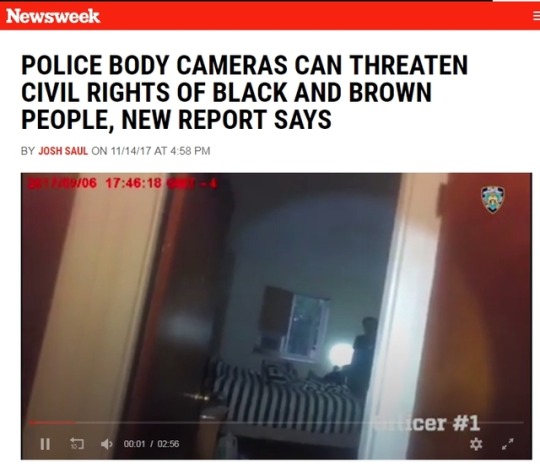
>POLICE BODY CAMERAS CAN THREATEN CIVIL RIGHTS OF BLACK AND BROWN PEOPLE, NEW REPORT SAYS< - Newsweek
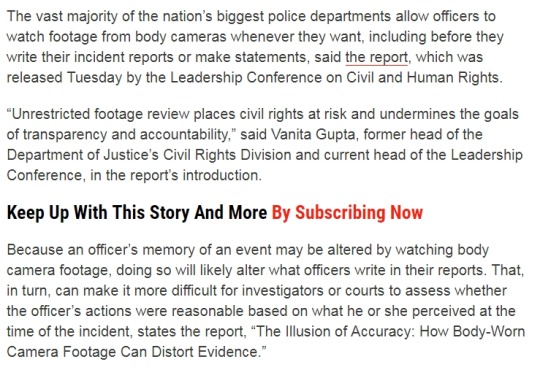
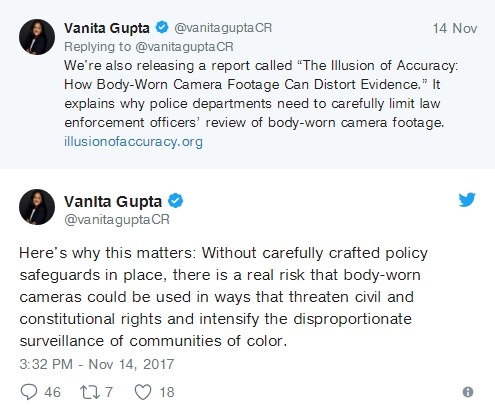
So, after literal years of people demanding bodycams, this organization is suddenly complaining about their use?
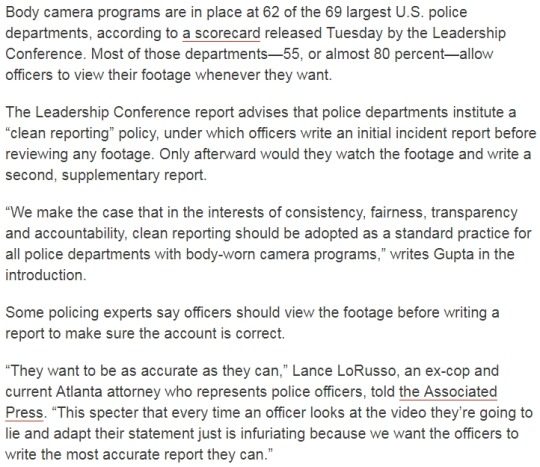
Also, how is this a “civil rights” issue? “Communities of color” (IE poor black neighbourhoods) are “disproportionately surveilled” because that’s where a lot of crime happens. Black people have a higher chance of being murdered than any other racial group. By other black people.
#nuance#rebuttal#policing#body camera#sorry for the double-rebuttal#but this one was legitimately too easy to refuse
1K notes
·
View notes
Photo
I'm skeptical of this accounting of events. Not because it's not possible that the LAPD just wanted to show-off a new toy and royally messed up, and that they didn't care about collateral damage, but I don't think it's all that likely.
TL;DR: A lot of the above arguments (and similar arguments I have seen elsewhere) seemed based in misreading sources, bad faith, or misinformation. It's certainly possible that the LAPD made a mistake here, but it's equally possible that there was some unknown or unforeseeable mechanical error, or just an error in policy. Any person who is seeking to ascribe malicious intent to the LAPD, or any kind of utter recklessness to the LAPD is doing so prematurely.
First, there are a ton of articles about how LAPD doesn't know the cause of the "explosion" that happened and people are reading this as the LAPD denying that they set-off the fireworks that caused the explosion. However, I think this is reading those statements in the worst faith possible given the scenario. In this case, there are essentially two explosions: The controlled detonation of the fireworks, and the explosion of the bomb disposal semi-truck. If you just read the LAPD as talking about the actual explosion of the truck itself, the statements make sense–to the best of my knowledge (and the media reporting) the LAPD do not in fact know why the bomb disposal vehicle exploded.
Now, you can claim that they are lying and that they messed-up. But they're not currently saying that and have called in ATF investigators from across the country to determine why exactly the breach of containment occurred. So, that says to me that either (1) the LAPD wants to waste literally everyone's time or (2) they legitimately don't know why the explosion happened and want to figure it out to make sure that it doesn't happen again. If it was police incompetence, which it very well might have been, it doesn't seem like it was willful incompetence.
Second, the above account implies that the LAPD moved the explosives to a poor black neighborhood to detonate them. This is wrong. Instead, the explosives were not really moved. Most of the fireworks (between 4,990 and 4,985 of 5,000 pounds depending on your source) were transported to a remote disposal site where they were defused, detonated, etc. The 10-15 pounds of explosives in the truck were deemed unsafe to transport by the bomb disposal squad, and therefore remained in place. The reason why the detonation occurred around a poor black neighborhood is because that's where the fireworks/explosives were being stored. There's not any kind of malicious or willful moving, or malicious or willful disregard of the setting here. Or, at least I can't find anything other than speculation from people who don't seem to have any more information than I do.
Oh, and what was detonated likely weren't fireworks. Multiple experts have said that based on the size of the containment breach and resulting explosion that the ordinance the police detonated were not fireworks for a local celebration. They were high-powered explosives. So, I also don't think any claim that the detonation didn't need to happen is particularly convincing.
Third, the official number appears to be 17 people, with 9-10 of them being officers/ bomb disposal squad members. So, the majority of those injured were part of the LAPD. Again, if there was any knowledge about responsibility, I seriously think that they would probably just cop to it at this point and fire the officers who were responsible (or allow their prosecution). There would be no real reason to defend their actions–especially since other officers were harmed.
Fourth, experts say that there's a human error possibility (such as not sealing the chamber properly) or a mechanical failure, or both. However, these sorts of detonations occur nationwide and are not particularly uncommon. Containment units cost tens of thousands of dollars, but I'm not sure how reliable the claim is that this was a new unit or that the police wanted to "show it off."
All-in-all, I think any intentionality here is in the eyes of people who don't have all the information and are reading it into the sources that are available to prove their narrative as opposed to determining what happened. I don't fault people who were originally responding to the incident for being suspicious, but it seems that in the following days those suspicions were not borne out.

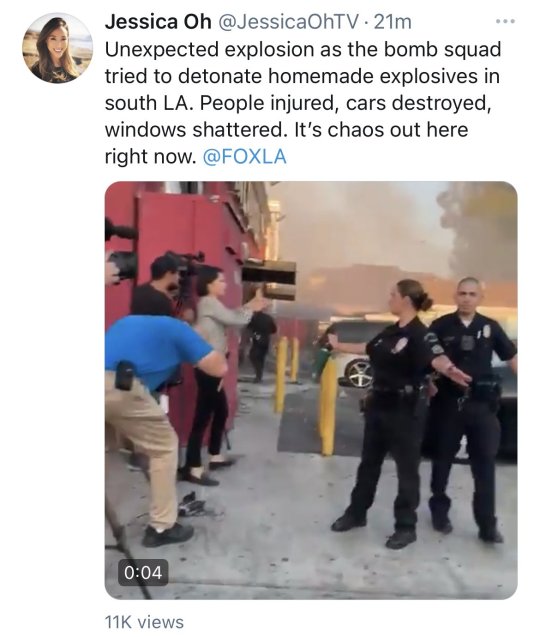
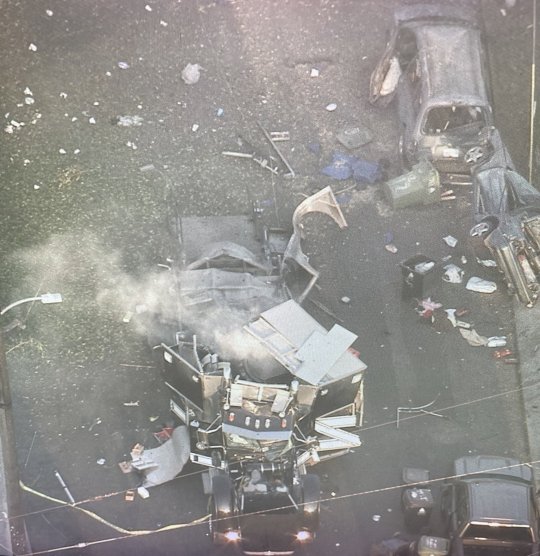

92K notes
·
View notes
Note
The standard of liability that civilians are held to is that anyone who conducts a no-knock raid is guaranteed substantial prison time, and is likely to be shot. Any movement towards applying a similar standard to the police is an *increase* in fairness.
Okay, but you're changing the principles of the hypothetical I put forward and therefore making a different argument. I agree with what you're saying here. However, the hypothetical was explicitly in a scenario where a no-knock raid was authorized and about where to assign liability in a situation in which the officers conducting the raid were responsible for the injury but not the misconduct.
If you read the rest of my post(s) on this issue, you'll see that my preferred remedy is actually eliminating no-knock raids altogether as I think that they are essentially an exercise in bad policy as everyone can do "their job" and innocent people still get hurt.
So, I entirely agree with you that a movement towards banning no-knock raids (or, as you've put it, a move towards holding police to the same standards as civilians when conducting a no-knock raid) is an increase in fairness. In fact, that's exactly what I was advocating. I was arguing against keeping the possibility of no-knock raids and automatically holding the officers conducting the raids responsible when someone gets hurt.
#nuance#response#this is probably the closest thing to a rebuttal that I've done in q&a#q&a#policing#kind of qualified immunity adjacent#loving the more frequent asks#keep them coming
3 notes
·
View notes
Photo
...The part where it applies to people's Fourth Amendment rights to not be unreasonable searched or seized (wherein an arrest constitutes a seizure)? The point of the report mentioned in the Newsweek article is that officer reports oftentimes serve as important evidence during pretrial, trial, appellate and post-conviction legal proceedings. I can actually attest to that. In working with the Innocence Project, I've dealt with a ton of official police reports as an evidentiary source for what a reporting officer knew (or claimed to have known) at the time compared to their trial testimony of what they swore under oath that they knew. If an important detail is left out of the officer's official report, that lack of detail can be used to help impeach the officer's credibility to the factfinder (i.e. the judge or jury) and to attack the testimony as less-credible.
The issue with body camera footage is that even if an officer did not notice a crucial detail at the time of their action (which is all that matters under the law in terms of police use of force. Whether or not the officer was reasonably in fear for his or her life at the time of the incident) they very well might notice it during the post-action review of body camera footage. If this happens before the officer writes the official report, the officer can add that detail that they observed through the body camera footage to the official report as something that they remembered from the incident itself. There would also be no real way to impeach this addition as the body camera footage would back-up the officer's "recollection." Basically, the idea of the report is that because the criminal justice system places such a premium on officer memory and the official reports as a source of evidence, officers should be required to write the official report before reviewing body camera footage in order to preserve the accuracy of the official report as a record of the officer's recollections. I really don't think it's all that complicated to understand.
As for the racial aspect, I mean. It's probably due to the fact that the current zeitgeist in criminal justice is calling out racial disparity based on disproportionate effects of police policy (e.g. because POC are more likely than white people based on population size to be arrested, any flaw in the criminal justice system is reflected ore substantially in those populations), but there are also studies and statistics that abuse of systems, and bad police practices are more likely to affect POC than white people. However, if you were to push-back and say "doesn't this police practice affect everyone?" I don't think that you'd get much of an argument from the authors of this study.
Also, where exactly is the Gish Gallop? There's one source cited, and the argument itself is a direct response to the incredulity of your original post where you seemed exceptionally surprised that this organization, and other criminal justice reform organizations, aren't supporting body cameras absent any kind of restrictive or restraining policy. The response is that it's not the body cameras themselves that are a problem, but rather the policy around body cameras that is the problem. This organization does not want to get rid of body cameras. That would be hypocritical. Rather, this organization is calling attention to the fact that the mere addition of body cameras doesn't solve all of the problems and can in fact create new problems (or reinforce old problems) if it's not done correctly. It's a call for better body camera implementation policy surrounding police reporting.
Pointing out that something that someone still supports has had unintentional consequences and lobbying to change the system to prevent those consequences is not shifting the goalposts in any way, shape, or form. Shifting the goalposts would be if the main goal of implementing body cameras was increased surveillance and the then was to claim "actually, we wanted to reduce discrimination against POC all along!" This is just a redefinition of the goal: The goal remains to provide greater police accountability and address bad police practices. There's just another step to doing that based on the data from the report.
If you think that's shifting the goalposts, then you're either (1) engaging in bad faith here, (2) not understanding the argument, or (3) not understanding the fallacy. Pick your poison. But what you're not doing is making a good argument. But you know that.

>POLICE BODY CAMERAS CAN THREATEN CIVIL RIGHTS OF BLACK AND BROWN PEOPLE, NEW REPORT SAYS< - Newsweek


So, after literal years of people demanding bodycams, this organization is suddenly complaining about their use?

Also, how is this a “civil rights” issue? “Communities of color” (IE poor black neighbourhoods) are “disproportionately surveilled” because that’s where a lot of crime happens. Black people have a higher chance of being murdered than any other racial group. By other black people.
#nuance#rebuttal#police practices#body cameras#policing#criminal justice#criminal justice reform#This would fall into the read the full source issue of argumentation#well if the argument was in good faith to begin with of course
1K notes
·
View notes
Text
Not going to dispute the non-lawyer takes here. Just going to add my two cents as an almost-lawyer (an attorney larva if you will) based on a quick reading. I'll list my thoughts in short sentence form. I'm more than happy to elaborate if someone would like me to.
Just as a disclaimer, I am against this kind of law on principle as it is a limitation on freedom of speech and free expression that I think is unnecessary. Furthermore, I am especially against this kind of law if it is going to affect colleges and universities. The students at colleges and universities are adults, and if adults can't handle critical theory applied to race, then we have other problems.
TL;DR
Oklahoma: Decent, but there's some issues
Idaho: Surprisingly good, only a few issues
Iowa: Pretty bad. Too broad and vague. Over-inclusive.
Texas: Incredibly comprehensive in a negative way. Bad, but not necessarily vague (though some language is very broad).
Tennessee: Some bad language, but some mitigating factors. Also, I don't see the creator language in the final product. Middling.
New Hampshire: An anti-Critical Race Theory law that I might fully agree with depending on the exceptions and their strength.
Florida: Not even a bill/law. Can't find the text. What I can find looks like garbage.
I encourage everyone to read my more specific thoughts below (and the bills themselves which I've linked) if you've got the time.
Oklahoma: Decent law. The only issue is that it hits public higher education (AKA colleges and universities) and it forbids the teaching of unconscious racism/ racial biases which go against a lot of psychology (but is something that conservatives/ people generally against CRT also disagree with). Other than that, it's fine. No major weird issues.
Idaho: Even better than Oklahoma. If there's going to be an anti-CRT law, it should probably look like this one. Very limited and specific. Does not hit unconscious racial bias. My only issue is that it does hit public higher education in Idaho. Otherwise, solid. Good work from the Gem State.
Iowa: Not a great law. Hits things like implicit bias training which are really important in some fields as well as the idea of unconscious bias similarly to the Oklahoma law. Also attacks the idea that the United States is "systemically racist" which can prevent some discussion of areas like criminal justice, historical development of law, etc. Also there's a catch-all for "any other use of race or sex scapegoating" that is going to give lawyers and teachers fits. It's harder to interpret the limits of this law–especially if one is not versed in legal interpretation. Of course, this law also hits higher education in Iowa and is therefore also too broad. Chances are that this law is incredibly over-inclusive for the kind of material that the legislature was actually seeking to ban.
Texas: Tries to be very comprehensive. Does say that parts of race relations must be taught which is better than some of the doomsday predictions left-wing people are espousing. Some nebulous language that I don't like at all and can see ways in which things could be twisted. Hits unconscious bias similarly to the Oklahoma and Iowa laws. Phraseology "an individual should be discriminated against or receive adverse treatment wholly or partly because of the individual's race" seems like it could be applied against things like affirmative action and other similar policies (because white applicants are being discriminated against, in part, because of their race) which I'm not a fan of. The specific point about American values is kind of weird considering that the founding American values were very narrow in their original application, but I don't disagree with the idea that America was founded on liberty and equality. The mention of the 1619 project is jarring and seems rhetorical in scope. Oh, and it hits higher education of course. I don't like this one.
Tennessee: Some really bad language in this one. Adds "privileged" to the "consciously or unconsciously racist or sexist" bit which is just... really bad for any sociological understanding of the term (or an sociology class). Although, I suppose this could depend on the definition of "inherently" as applied in the courts (although I wouldn't bet on a particularly narrow interpretation given the clear intent in the bill itself). The meritocracy section includes a ban on teaching that a meritocracy is or was designed by a particular race or sex to oppress another race or sex. This could be fine if it's applied in the abstract (e.g. the concept of meritocracy). However, it could be read to apply to specific examples of so-called meritocratic systems (e.g. meritocracy in the United States and the designing and purpose of meritocratic systems throughout US history) which is on dodgier grounds historically and potentially restricts important discussions. This might be mitigated by the section of the bill that allows for impartial discussion of controversial aspects of history. The section on promoting "division between" races and sexes is also a little odd, though I think a court will interpret it properly given context clues. I don't see the section on rights endowed by a creator in the final copy that the Governor signed. I might be using the wrong copy, or it might have been taken out in a final edit. The "creator" text also does not appear in the summary of the final bill on the Tennessee Legislature Website. @morlock-holmes, you might want to take a look at this (though if that language was to have appeared I would entirely agree with the take Morlock made on it. That would be inexcusable).
New Hampshire (hidden in the budget. Starts at p. 144): Already more careful than many of the other bills to specifically NOT target universities and higher education in New Hampshire. Does hit unconscious bias (and the concept of unconscious oppression). "Solely or partly" language again seems like it could be used against explanations of affirmative action, though unlike the Texas law this does seem to cut against a commonsense interpretation of the bill. Broad exception granted to the discussion of the history of the banned subjects is nice. I can see that applying very broadly indeed. Overall, this one might be the best one up there with Idaho. Great job Granite State! Heck, I might even be totally okay with this one depending on the scope of the exceptions to higher education.
Florida (no law, just a rule specifying that critical race theory can't be taught): I really can't find the full text of this one basically anywhere. Not without more effort than I'm willing to put in. However, seeing as amendments comparing critical race theory and the 1619 Project to things like Holocaust denialism appear to have been passed, I'm going to say this is the worst one and I hate it.
So, of the attempts to respond legally to the "Critical Race Theory" foofarah, my non-lawyer I-might-have-missed-something rankings of what I've read so far:
Oklahoma: Harmless and possibly actually helpful
Texas: Harmless, goes out of its way to enumerate that several very important parts of the history of American race relations must be taught, which seems okay but it makes me laugh that they also included language about one specific book that they don't like.
Tennessee: Harmful, overbroad language (It's worth comparing to the Oklahoma statute) that seems vulnerable to a first amendment challenge because it says you can't teach anything that would suggest people aren't endowed by their rights by a "creator".
Florida: Really fucking stupid.
#nuance#response#critical race theory#politics#legislative analysis#might do more stuff like this in the future#relates to the work I'm doing with my state legislature in criminal justice reform
23 notes
·
View notes
Note
Honestly surprised you haven’t yet covered the CRT debacle that’s currently trending.
Hah. Yeah, I have managed to stay out of that one for a while. I guess my issue there is that I'm just a little out-of-the-loop as to what the problem with CRT actually is based on my experiences.
CRT began in Harvard Law School, and is frequently taught, at least to some extent, in legal education. For example, my Con Law class in my 1L year was focused around Brown v. Board of Education and some other Civil Rights cases as examples of different styles of interpretation of the Constitution, and to learn about strict scrutiny we talked about race issues and the development of things like affirmative action, the overturning of the ban on black jurors, etc. We learned that for a while, the American legal system allowed for, supported, and fostered a racial hierarchy, and that such a hierarchy did not immediately collapse after Brown and instead remained into the 1980s and 1990s, and even the 2000s. We also focused on gender equality through learning about women's rights in the Supreme Court, and LGBT equality through an in-depth study of where Obergefell came from. Was that to some extent CRT? Some might say so. I would say no. And therein lies the rub.
The main problem with this debate is that people can't even agree on the terms of the debate let alone the scope of the debate. It would be like trying to have a conversation with someone about how you hate No. 2 pencils when they had no conception of a No. 2 pencil and thought that a highlighter, a fountain pen, a quill and ink, a Sharpe, etc. were all No. 2 pencils. From what I've seen, conservatives seem to be making CRT the next "boogeyman" the left is implementing to corrupt the minds of children. Whereas the left seems to be defining CRT as saying "sometimes, America is racist." I think that's bad faith by both sides here. CRT is a little more than just pointing out that a racial hierarchy exists or talking about the fact that there's still systemic racism. However, it's not so much more that these conservative views make sense.
For example, there's a lot of play in the notion that young children are going to be taught things about systemic racism and how white people are inherently evil and the like. There's also a lot of airtime devoted to the idea that CRT claims that America is fundamentally racist and this will damage children as well. To me, I don't really get the hoopla with those two claims. First, I don't think a single proponent of CRT is advocating teaching young children complex sociological concepts. If there was to be any CRT in elementary schools, it would likely be very minimal (for example, discussing how black people and white people had different interests and wanted different things, and what those things were). Second, I don't see how you can learn about slavery, the Civil War, Reconstruction, issues that still faced black Americans throughout the Civil Rights period, and modern issues such as problems in criminal justice, the wealth gap, etc. and come to a conclusion that somehow precludes the United States from being racist. That's... some massive cognitive dissonance if I've ever seen it. In his July 5, 1852 speech "What to the Slave is the Fourth of July" Fredrick Douglas lays out this very issue:
I am not included within the pale of this glorious anniversary! Your high independence only reveals the immeasurable distance between us. The blessings in which you, this day, rejoice, are not enjoyed in common. — The rich inheritance of justice, liberty, prosperity and independence, bequeathed by your fathers, is shared by you, not by me. The sunlight that brought life and healing to you, has brought stripes and death to me. This Fourth [of] July is yours, not mine. You may rejoice, I must mourn. To drag a man in fetters into the grand illuminated temple of liberty, and call upon him to join you in joyous anthems, were inhuman mockery and sacrilegious irony.
I had a take over the summer when people were talking about how we as modern-day Americans shouldn't idolize people like George Washington and Thomas Jefferson who were slave owners and should instead treat them as actual humans who had flaws as opposed to the golden-gods of the founding of the United States. And that take was "wow, the people who didn't pay attention in history class are finally learning some history, huh?" I think that's somewhat the case here as well. CRT and its preponderance is forcing conservative, moderates, and even some liberals to confront some of the cognitive dissonance that they've been abiding by or using for quite some time. And they don't like it. I think I largely stand by that take.
Plus, there's some CRT posts in the works/ queue. So you'll see some soon!
#nuance#q&a#response#crt#critical race theory#politics#discourse#really enjoying the more frequent asks#keep them coming
0 notes
Text
A few things to say here. But here's a very quick summary.
TL;DR:
(1) Sovereign immunity does not apply to municipal/ local governments (like the City of Louisville) in all situations, so you can sue them for torts in some circumstances.
(2) The point of the hypothetical I gave was that everyone is acting in good faith and people still get hurt. The Supreme Court has frequently, in like situations of good faith by police officers, excused misconduct up to and including the violation of constitutional rights.
(3) Police indemnification already creates an insurance-like system that clearly is not working.
There's substantially more analysis and discussion under the cut, so I recommend you read if you have the time or inclination.
1. The United States does still have some form of sovereign immunity, but sovereign immunity applies to the Federal and State governments only and applies with numerous exceptions carved out by things like the Federal Tort Claims Act and the like. Local/municipal governments are not entitled to full sovereign immunity under Monell v. Department of Soc. Svcs, 436 U.S. 658 (1978) (Overruling Monroe v. Pape's grant of total sovereign immunity from § 1983 claims and holding that there was limited municipal liability under § 1983 and other similar torts). Under Monell, a local or municipal government may be sued under § 1983 (which is a general statute that allows for suit when someone's constitutional rights are violated) or other individual torts where "the action that is alleged to be unconstitutional implements or executes a policy statement, ordinance, regulation, or decision officially adopted or promulgated by those whose edicts or acts may fairly be said to represent official policy." Monell, 436 U.S. at 659. Likewise, suit is also possible if the deprival of constitutional rights was due to government "custom" even if such custom has not received formal approval.
So, it is in fact entirely possible to sue the local government in charge of the police. In fact, that's exactly what Breonna Taylor's family did and won a 12 million dollar settlement from the City of Louisville. The only issues are showing that the action that caused deprivation was the result of a local policy, which in this case, is not particularly difficult. It might eve be covered by showing that, for example, the early-morning timing of the raid was due to government custom or unofficial government policy as well and that it had an unconstitutional element itself. So, you could be double-covered, or at the very least would have a legally cognizable argument to make.
So, I would posit that the best place to put liability is in fact on the municipality in situations in which the individual officer was not the one ultimately responsible for making the decision that cost an innocent person their life–if there is to be liability at all of course as opposed to just eliminating the practice and creating a per se liability for ignoring such a prohibition.
2. I think that error-adjacent is more due to the fact that if one presumes that the officers conducting the raid acted in good faith and following their due diligence, they likely still would have made the same decisions. The error comes not from the actual raid team, but from record-keeping that is incorrect with the address being wrong in both the computer system the police are using and the actual warrant that they are executing. In such a scenario, even if the raid team sought to double-check with the information either on the warrant to be executed, with the judge, or in the police systems they still would have received information that led them to the wrong place.
The idea was to present a situation where assigning legal liability to the officers was highly debatable if not inherently unfair unless one assumes that the police, by nature of their profession, should be held to a much higher standard of liability than a civilian.
Insofar as we are talking about the hypothetical I gave, I would classify the error as in the record-keeping and everything else that occurs as a response to said error. This leads to a situation where the officers conducting the raid are responsible for the deprivation of constitutional rights, but not intentionally, and not in a way that they could have fixed through due diligence. The idea is everyone is acting normally in a manner in which they should be based on the information that they have and yet people still get hurt and harm is still suffered.
We've actually seen Supreme Court precedent that suggests that the officers would not be found liable in such a situation. See e.g. Herring v. United States, 555 U.S. 135 (2009), United States v. Leon, 468 U.S. 897 (1984). The Court seems rather willing to bestow things like "good faith" exemptions on officer conduct that was based on misinformation that the officers could not have known at the time of their conduct up to and including the violation of people's constitutional rights.
This is why I support things like a blanket ban on no-knock warrants and a reassessment of police powers and the role of police more than things like shifting liability to officers–to do so is potentially both over and under inclusive.
3. There have been a number of very interesting studies on police and insurance, some of which have results that indicate that such a system would have results contrary to what people want. Additionally, per research on qualified immunity from most legal experts (which I sadly cannot provide as it's from subscriptions to WestLaw and LexisNexis) indemnification, or the process in which a municipal government pays for the losses assessed to an individual police officer or department, occurs at a conservative estimate in upwards of 75%+ of all cases where the officer is found liable. So, we essentially do have some form of an insurance system dealing with police accountability at the moment and it... doesn't seem to be working.
Perhaps a more defined and "official" system of police insurance will change things, but I'm rather skeptical that's the case.
If you are going to say that maybe The Left needs to ease up and increase police funding then for those of us who don’t have the brain of a goldfish you should include some measures to ensure that the police are under civilian control.
#nuance#response#partial rebuttal#policing#a little bit of qualified immunity#but not too much#wouldn't want to spoil our appetite for criminal reform
312 notes
·
View notes